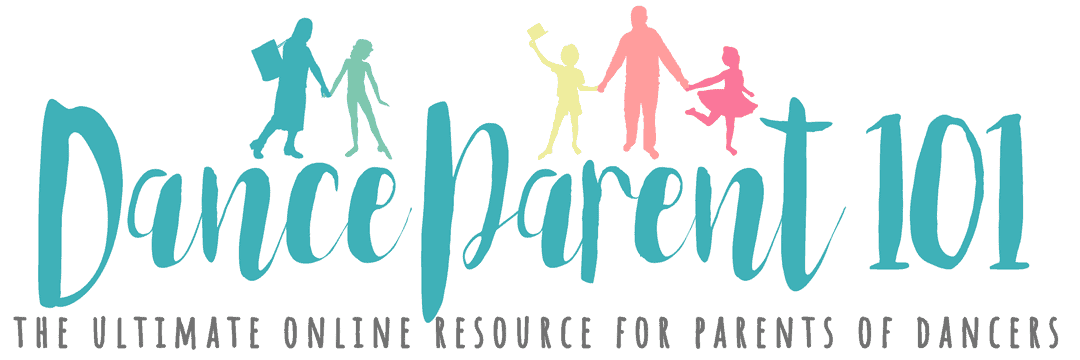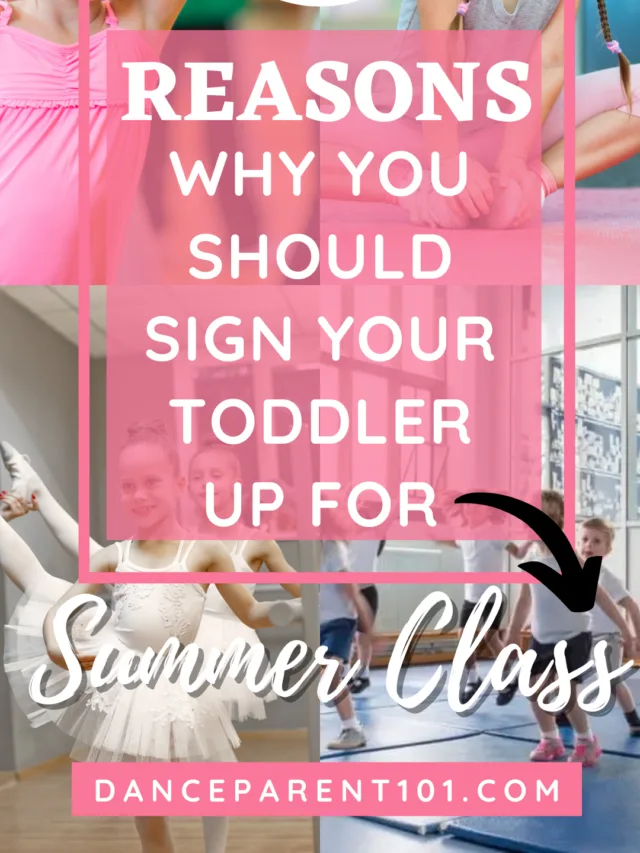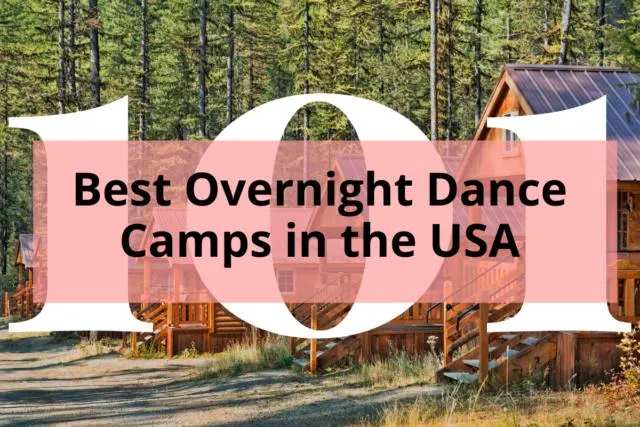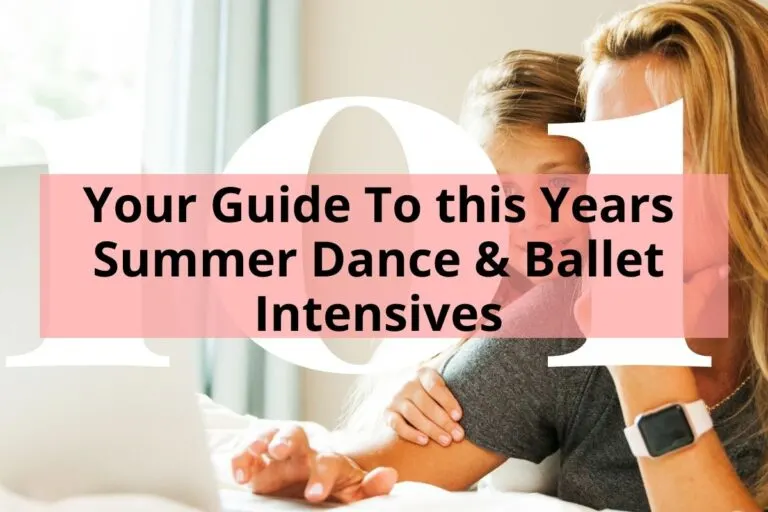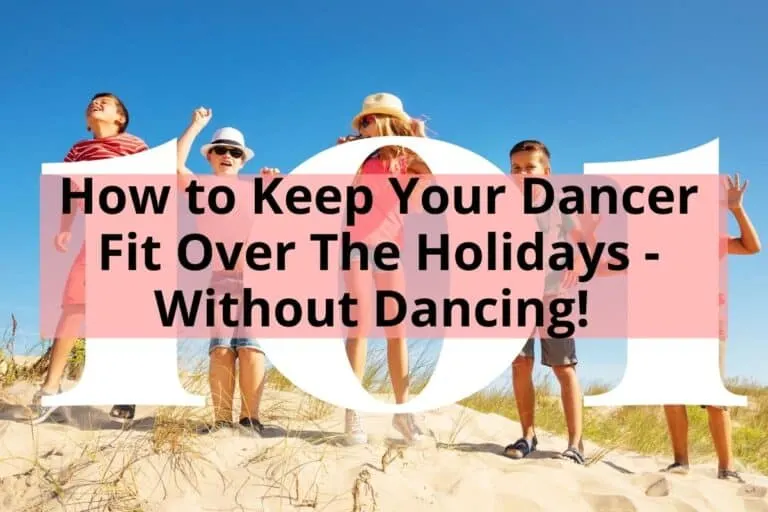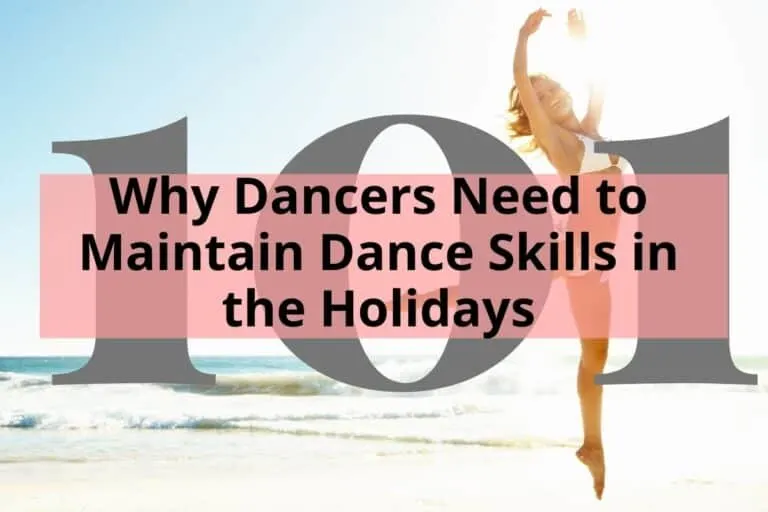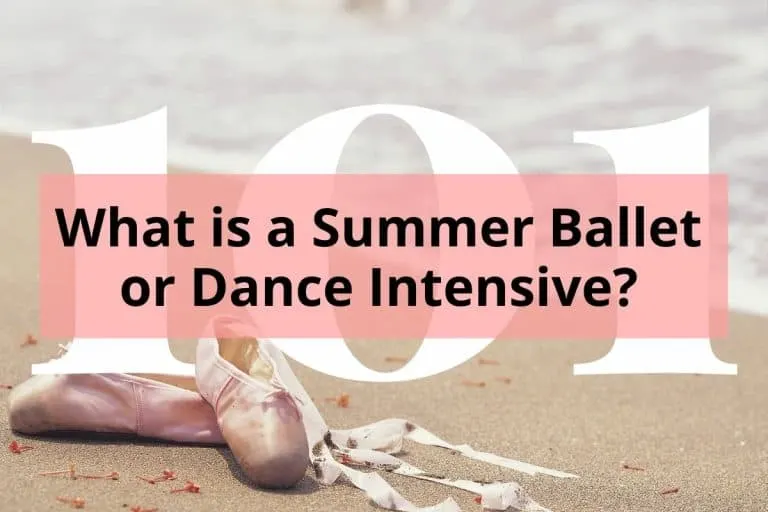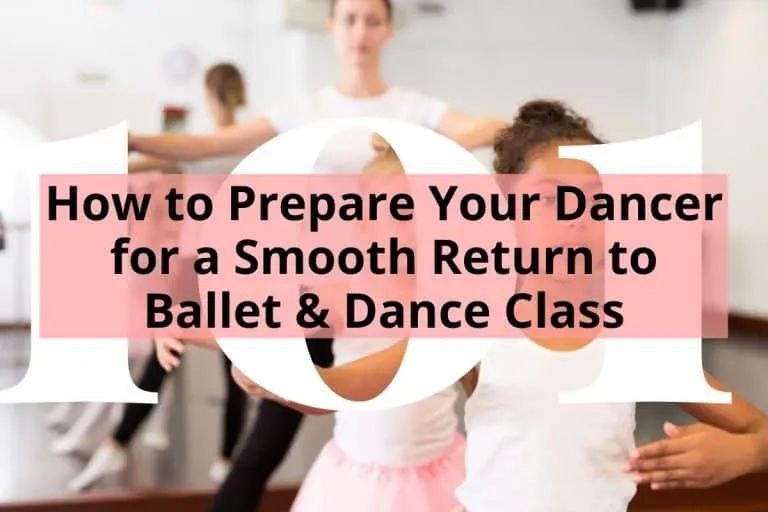By Danielle Pierce-Master, MA Dance / Edited by Samantha Bellerose, B.Ed, Dip.Dance (Performing Arts)
Your toddler loves to dance, but it is summer break and most dance studios are only offering dance camps or intensives or shorter dance programs just for the summer and so you are wondering if it is worth signing your two, three, or four year old up for summer dance classes. Well, I am here to give you all the wonderful reasons why you should be signing your toddler up for summer dance classes as well as a few of the cons you might also want to consider!
Is a toddler too young for dance class? Never! Some summer dance programs begin classes for children as young as 18 months (and some, even younger). With shorter session commitments and a variety of class times, summer can be a great time to start dance classes for toddlers.

“Toddler” Dance classes are typically offered for 2-year-olds and 3-year-olds as a “Parent/Caregiver and Me” class or as a drop-off class, generally from around 4 years old. Children are ready to separate at different ages so many studios offer both and allow parents to select what is best for their families.
Expert Advice
In addition to my experience as a dance educator and parent, I interviewed four fellow dance-teaching mamas to add their perspectives. Deborah Cofrancesco, the director of the Maywood Dance Center in Maywood, New Jersey; Cleveland-based early childhood Dance Educator Maria Hanley who is currently part of the faculty at Bold Arts; Heather Garbrandt, a Long Island, NY- based ballet teacher for various studios; and lastly Adjunct Professor of Dance at West Liberty University Jill Warren.
- 1. Summertime Sample
- 2. Novelty in Summer Class Themes
- 3. An Opportunity for Connection
- 4. Getting Used to a Classroom Setting and Developing Independence
- 5. Prepares children for school
- 6. It’s Great Exercise!
- 7. Imagination and Creativity
- 8. Development of a Mind/Body Connection
- 9. Friendships
- 10. Improves Confidence
- 11. Grown-Up Time!
- Disadvantages to doing summer dance classes with your toddler:
- Where to Look for Classes & Links:
- Share this article on Pinterest Now!
- Check Out our Google Web Story
1. Summertime Sample
Summertime is a great time to try a new activity, without the commitment of a semester or school year. A summer session is long enough to give a child time to get used to the environment, but shorter (and therefore less costly) than academic year terms. Families can get a feel for a studio or class and determine if it’s a good fit without too much financial or emotional investment.
2. Novelty in Summer Class Themes
In addition to being a shorter commitment, summer classes and camps may offer some extra bells and whistles, like an art component or a theme. Deborah Cofrancesco, director of Maywood Dance Center in Maywood, New Jersey, has offered camps focusing on different story ballets, dance around the world, unicorns and princesses, and “Dance ABC 123,” which is a program that uses dance to build understanding about academic concepts.
3. An Opportunity for Connection
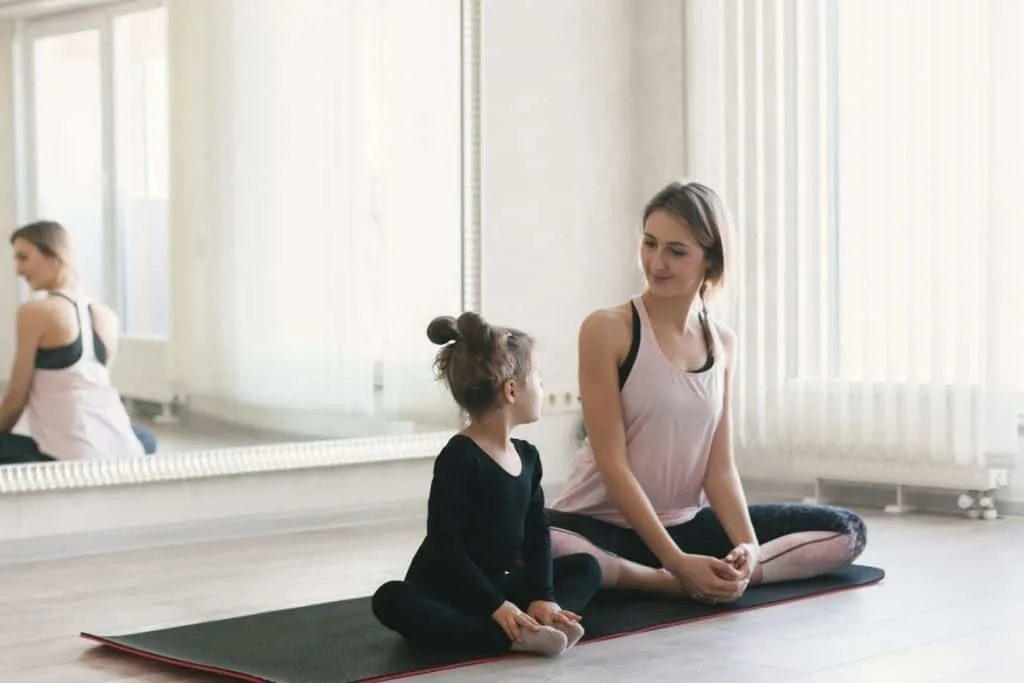
In parent participation classes, dance classes offer a new way for the adults and children to connect, and new activities that can be done at home. When my daughter and I attended a parent-child class, she loved the songs that the teacher sang. I would sing those songs to her at home if she got upset, and most of the time, it helped her to calm down. Plus, the grown-up gets to move their body a little too. Overall it was a great experience to add to our summer that year!
4. Getting Used to a Classroom Setting and Developing Independence
For many children, dance class is their first classroom, ever! Because dance classes are fun and engaging, they help young students get used to leaving their parents and following the directions of different adults. Cofrancesco says, “Parents often comment that their young child who has come to drop-off summer dance camp had an easier time separating when they begin preschool in the fall.” It is also helpful for parents who need practice separating from their kids- sometimes it is harder on the grown-up than the child!
Grown-Up and Me classes also offer young children the opportunity to develop independence, even though parents or caregivers are still in the room. Children might be asked to get a prop for themselves and their adult or be in a line of only the young dancers. These small steps help get the child used to the environment and the flow of a class, so when the time comes for a drop-off class the transition is smoother.
5. Prepares children for school
All of the self-regulation skills necessary for success in school can be cultivated and reinforced through dance. “Dance develops discipline, focus, listening, social skills, all in a group setting,” Cofrancesco says, “It channels their energy in a positive way, which improves their overall behavior.” Learning new skills in dance helps a child to develop a love of learning in general, which leads to more excitement and success in school.
One component of dance class is learning movement sequences, like “Jump, Clap, Run, Freeze.” The practice of repeating a sequence or pattern develops a child’s memory and recall skills. Teachers might also use nursery rhymes or repeated songs to help children practice steps, which also build early literacy skills.
6. It’s Great Exercise!
In the current state of the world, where many children are not able to play outdoors as much as they should, the physical benefits of dance class become increasingly important. The American Academy of Pediatrics suggests two or more hours per day of physical activity for children ages 2-5. Dance develops balance, strength, coordination, and stamina in a fun and delightful way.
While you can probably picture a small child holding a ballet pose on one leg and know that he or she is practicing balancing, there are other ways in which dance class helps children to improve their balance and gross motor control. The vestibular system which is responsible for balance is made of the three canals inside the inner ear. These work like “motion sensors” and help to balance the body. Common components of dance class for toddlers such as rolling, rocking, turning, swinging, and swaying, all help to stimulate the vestibular system, which helps to improve their balance not just for dancing but for their everyday movement in general.
7. Imagination and Creativity
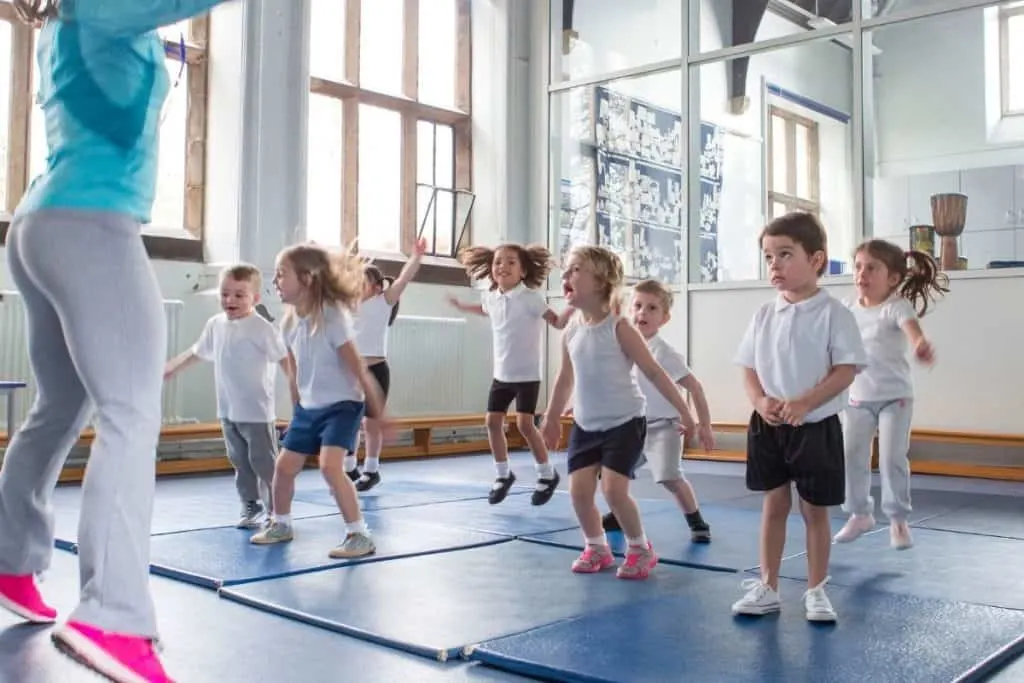
Cleveland-based early childhood Dance Educator Maria Hanley who is currently part of the faculty at Bold Arts says, “I like to expand their imaginations during my class by telling stories, turning props into things they could never have imagined, and making up songs with steps to random tunes! I find value in creating dances together.” Whether dancers are stretching their legs like a pizza, jumping like a frog, or pretending to dance like toys on a shelf, dance classes for toddlers are full of imagination and highly purposeful pretend play. Children explore dance concepts, invent their own movement ideas and broaden their perspectives. Heather Garbrandt, a Long Island, NY- based ballet teacher and mom of three notes, “Early childhood dance is more than copying steps that the teacher is doing but rather creating their own dances complete with characters, music, and stories.”
8. Development of a Mind/Body Connection
Often, when we think of a connection between mind and body, we think of adults in Yoga or Pilates trying to will their bodies into specific shapes. Early participation in dance classes helps kids to develop the connection between their brains and their movements, helping children to live a more fully embodied life. Adjunct Professor of Dance at West Liberty University Jill Warren’s son began taking dance classes at 20 months old. She says, “I’ve noticed him using movement to problem-solve, whether it is manipulating his body to observe something from a different perspective or moving his body in patterns, shapes, etc to help him as he practices letters, numbers, shapes, and other pre-school aged concepts.”
9. Friendships
It is not unheard of for children who dance their whole lives (those teens who “live at the studio”) to have begun in a baby or toddler class and to have made lifelong friends there. Dance friends are best friends, and those friendship can develop even at a young age.
10. Improves Confidence
The skills that children develop in dance class- new ways of moving their body, the ability to be a part of a group, focusing on a teacher, following directions, creating their own ideas, all lead to increased self-confidence. “They can dance in front of other people and know that not only is it ok for them to be seen but that they have so much to give!” Garbrandt says. “I think dance has brought a lot of confidence to my students and my own children. They work hard and it takes time but they do see results and that makes them feel proud.”
While all of the professionals consulted agreed that dance classes build confidence, Hanely’s classes are designed with that goal in mind: “Giving power to the dancers builds confidence in their decision-making skills. I let them make choices in their movement and with our activities. It’s important to me that they feel a sense of ownership!”
11. Grown-Up Time!
For drop-off classes, parents may be required to stay on the premises in a waiting room, but it is still an opportunity to take a break from the child who is in class. When my daughter started attending a drop-off class, I sometimes enjoyed the opportunity to catch up on my podcasts and sometimes enjoyed connecting with the other parents in the class. If your program allows you to leave the building, the world is your oyster!
Disadvantages to doing summer dance classes with your toddler:
Although there are so many more advantages to enrolling your toddler in summer dance classes, there are a few cons which are:
1. The Heat
If the dance studio you are attending does not have adequate air-conditioning your summer dance classes may prove to be an uncomfortable experience for both of you, if you are doing the class with them or whilst waiting for them to do their lesson. So if where you are living has extreme heat, this is something you will want to consider when choosing which studio you might like to do lessons at.
2. No Holiday Break
When you enrol in a dance program you are generally locking your child in to do all the lesson of that program and will be required to pay for every lesson – even if you cannot attend them all (most studios have absentee policies and make up classes if your child is sick). So if you are planning on going away for two weeks, your child will miss out on those lessons and you will still need to pay for them. This may not seem fair, but your teacher will still be at the studio prepared to teach your child and if the class is very popular, another child could have taken the spot and the teacher and studio would have been paid. If the class is not very expensive then missing a few in general to go on a summer holiday will not hurt you wallet too much – but also be aware if the program includes a recital at the end as your child may miss out on learning and preparing for that performance.
Where to Look for Classes & Links:
Most dance studios in you local area offer summer dance classes, so it is always worth giving them a call or checking out their social pages and website. Your local council, YMCA, recreation department or community centre may also put on special programs over the summer holidays and so these are the types of places you want to be getting in contact with to find out what they have on offer!
The following are a few dance schools who currently offer Summer Dance Classes for Toddlers:
-Creative Dance Center Seattle, WA www.creativedance.org
-Steps on Broadway NYC www.stepsnyc.com
-Maywood Dance Center Maywood NJ https://www.maywooddancecenter.com/
-Dionne Kamara Dance https://www.dionnesimonekamara.com/
-LUNA Dance Institute, Berkeley CA https://lunadanceinstitute.org/studio-programs/early-childhood/
-BOLD Arts https://www.bold-arts.com
-Local Motion Project, Alexandria VA https://localmotionproject.org/youth-programs/
-Dance to Evolve, Chicago IL https://dancetoevolve.com/
-Hudson Conservatory of Ballet, Hudson OH https://www.hudsonconservatory.com/
-Soul Centered Movement, Chicago IL https://www.soulcenteredmovement.com/
-Miami Fine Arts Academy, Miami FL https://miamifineartsacademy.com/summer-camp
If you can’t get to a studio there are many different online options you can choose from as well. For a list of free dance classes for toddlers check out the following article on Dance Parent 101:
Share this article on Pinterest Now!
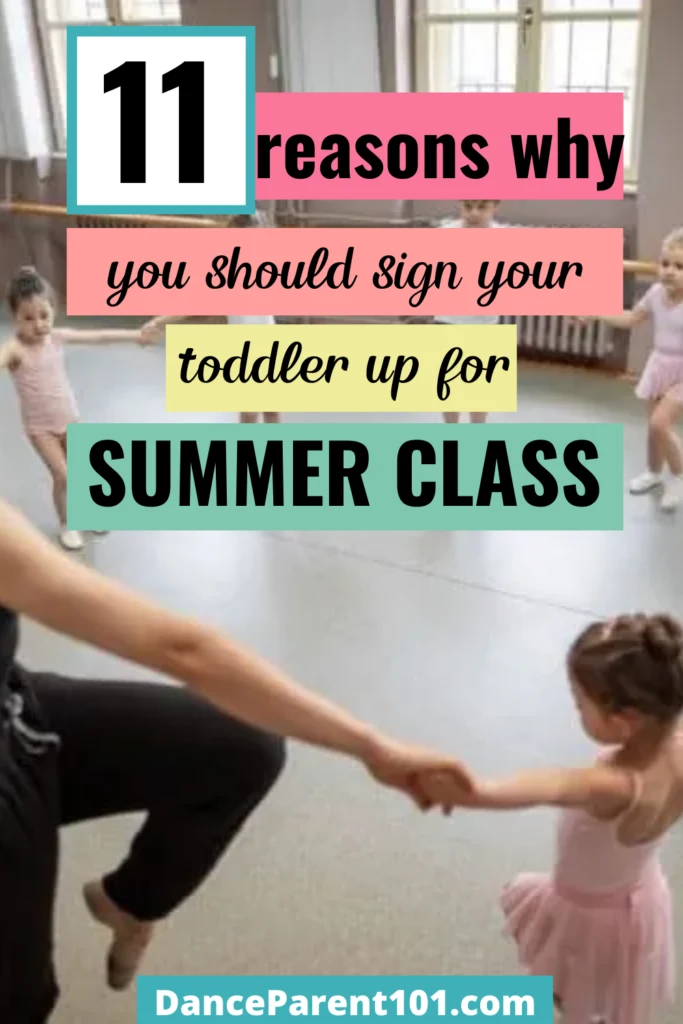
Check Out our Google Web Story
Best Overnight Dance Camps in the USA – List & Links
Dance and choreography camps are a fun way to keep up dance skills over the holidays, as well as make new friends. Dance camps can be overnight events or may be held only during the day and may range in length from a day to several weeks.
2022 – Your Guide To this Years Summer Dance & Ballet Intensives
Want to find a summer dance intensive for your dancer? Look no further than our guide with loads of intensives to choose from!
How to Keep Your Dancer Fit Over The Holidays – Without Dancing!
It’s the summer holiday season, and you know what that means! It’s time to take a hiatus from your child’s dance and ballet classes. No more afterschool runs to the dance studio, no more ballet rehearsals and organizing dance costumes, no more waiting in the car for them to finish…
Why Dancers Need to Maintain Dance Skills in the Holidays
During the summer holidays, your kid’s dance training is probably the last thing on your mind when trying to fill your family’s summer bucket list full of vacations, pool parties, and family time. You also probably want your child to be able to relax and rest, rather than work on…
What is a Summer Ballet or Dance Intensive?
You have just been speaking with some other dancers and their parents after class and find out they are all going to a summer ballet dance intensive during the summer break. Another dancer is going to a summer dance camp and another is going to a summer ballet workshop or…
How to Prepare Your Dancer for a Smooth Return to Ballet & Dance Class
After taking some time off from dance or ballet class, your dancer is ready to return to the studio. Whether they’ve taken a break to recover from an injury, spend a carefree summer break, or take virtual classes, the transition back to in-studio instruction will be a change for them.…
